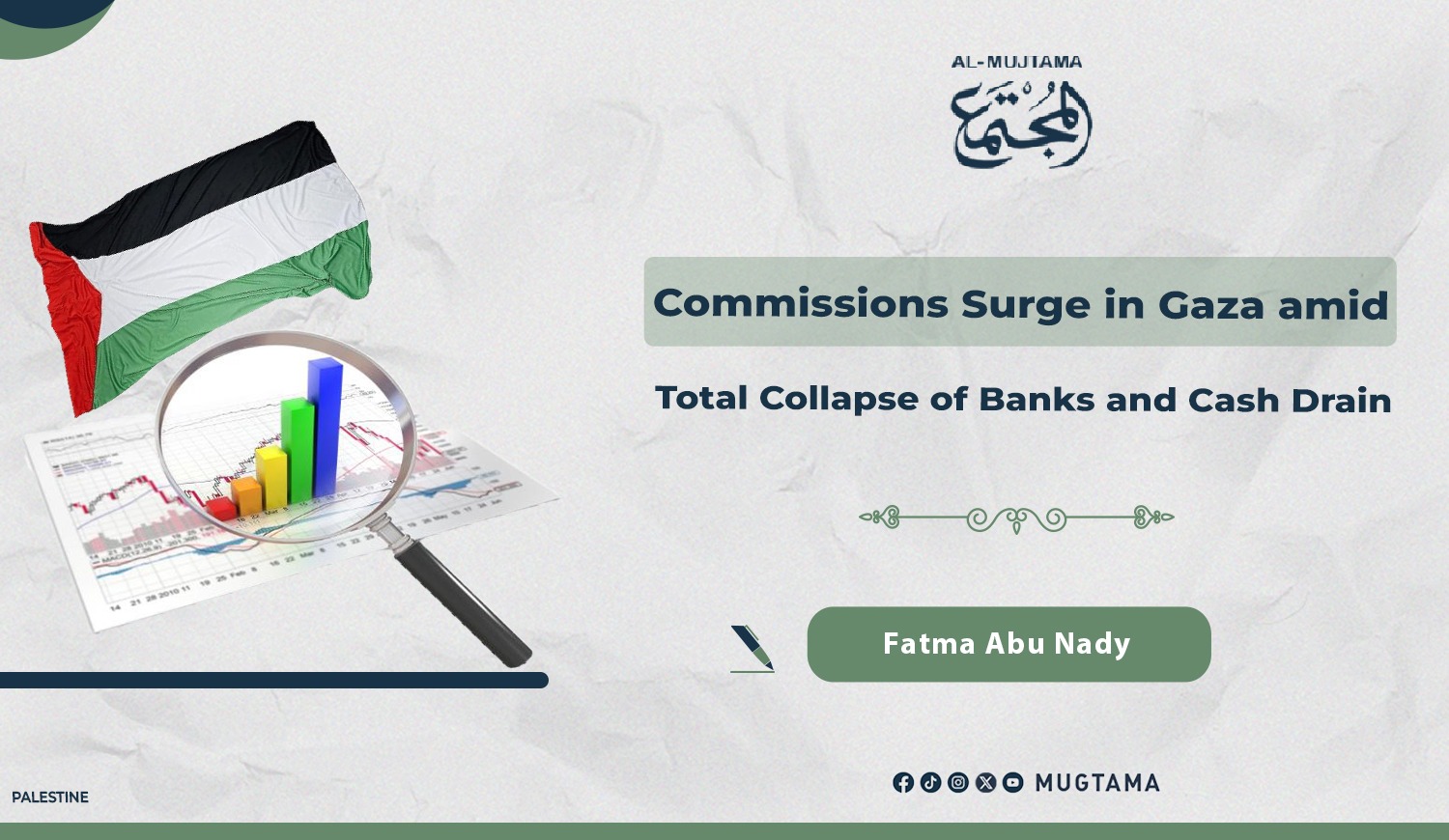Gaza is Starving
Commissions Surge in Gaza amid Total Collapse of Banks and Cash Drain

Due to the devastation of all banks in the Gaza Strip, which caused serious issues, including the inability to receive funds from banking institutions, the banking liquidity crisis started to develop in the early weeks of the war on Gaza. Additionally, it led to the rise of currency speculators and money dealers. Ordinary residents, government personnel, and workers in the healthcare and educational sectors no longer have access to it. These groups are now having trouble getting cash and supplying bank liquidity. The situation has also been made worse by the closing of crossings and a halt of regular trade activities, which were essential in supplying cash liquidity and making it easier for individuals to buy and sell.
While obtaining cash liquidity after much effort and at a rate exceeding 40% is something that challenges logic and human dignity, the war on Gaza has aggravated the economic conditions of the people, and providing cash liquidity has become one of the biggest daily challenges facing Gazan citizens—not for luxury, but to achieve their most basic rights to food and drink only, and to provide milk for their children to stay alive. Israel's refusal to allow cash to enter the sector, despite pressure from the Palestinians and other countries to do so to speed up life and the free flow of money, has further raised the burden on people. But to hurt Palestinians in many facets of their everyday life, the Israeli administration is adamant about causing a financial crisis. a life in which they are held prisoner by monopolists, dishonest traders, and the immoral rather than having funds available for spending.
The role of the
Palestinian Monetary Authority in light of the banking liquidity crisis
The Palestinian Monetary Authority's
function concerning the banking liquidity issue the ongoing Israeli attack
of the Gaza Strip has destroyed banks and their headquarters, making it
extremely difficult for the Palestinian Monetary Authority to provide monetary
liquidity.
Headquarters, making it extremely
difficult for the Palestinian Monetary Authority to.
According to a statement from the Palestinian Monetary Authority, the bombing,
the hazardous working conditions that its staff may encounter, power outages,
and the inadequate security situation make it impossible to open the remaining
branches to conduct withdrawal and deposit operations across the sector.
Due to this circumstance, there is currently an unparalleled crisis in the markets and among Gaza Strip people over the availability of cash liquidity. The problem got worse when the majority of ATMs stopped working, which led to people hoarding cash and those with big sums of money selling it in the market to move to their bank accounts. The high commission during these hours has reached 48%. People can no longer afford their daily needs of bread and legumes—all they need to survive—because of this heavy commission.
The
Monetary Authority tried to activate the electronic process to help and
facilitate people's daily lives, but the situation backfired in the Gaza Strip
when monopolists seized this opportunity to exploit people's needs. However, it
seems that this problem will remain unresolved until the end of the war, which
means that people's crisis will continue and remain hostage to monopolists and
commission traders Moreover,
even though the Central Bank has promised to recover the available paper
currency if the war ends and replace it with fresh currency, it has become more
difficult to manage and trade this worn-out cash due to its loss of shine. The
shekel is the Israeli money that Palestinians use for the majority of their
transactions, and since Israel has stopped providing the sector with new made
coins,
People ignored the Monetary Authority's guarantees, but merchants are becoming less willing to take old currency. They won't exchange these old Israeli currencies, which has made life harder for Gazans and forced them to use the threat of costly bank fees to get new blue notes to exchange and purchase food and medicine for their families.
Frozen cash liquidity and people without money
As we previously mentioned, the recent
Israeli conflict has resulted in a record number of attacks on civilian
infrastructure in the Gaza Strip, directly harming the economic infrastructure
that keeps Gaza afloat and facilitates daily life through banking activities
like withdrawals, deposits, and buys. Regretfully, like health and education,
all banks were totally destroyed by bombs. Nothing was spared in the Israeli
attack, which gradually hit the economy to killed people. Airstrikes then
targeted major financial institutions like the
Production Bank, the National Islamic Bank,
and the Bank of Palestine, causing their
headquarters to be destroyed and their electronic systems, including data
servers and ATMs, to be disrupted. The banks in Gaza were not immune to the
targeted and intentional bombardment.
Important banking functions like
withdrawals, deposits, transfers, and salary disbursements were stopped by this
direct destruction, which had an impact on people and organizations and brought
the financial system dangerously close to collapse.
Citizens were unable to access their accounts due to the banks' outage, and the
plight of workers and families who depend on financial aid—whether from the
government or foreign agencies like UNRWA—grew worse.
Commercial activity has also slowed down as a result of the crisis, particularly as bank transfers are used for the majority of commercial transactions. The main issues facing the Gazan market are low purchasing power, a sharp decline in income, and the almost complete lack of cash availability in shekel denominations.
Sustainable risks to the financial system
The absence of security stability and the continued threats to destroy what remains of the infrastructure prevent banks from resuming operations or rebuilding their headquarters. The obstruction of cash inflows from abroad and the freezing of bank transfers also turn Gaza's financial system into something resembling an "isolated economy," increasing the risk of the spread of the black market and bank transfers.
In addition to being a liquidity crisis, what is occurring in Gaza highlights the core flaws in the besieged and occupied financial system. The devastation of banks directly affects the economic and living conditions of two million people who are living in extraordinary circumstances, in addition to destroying buildings and offices. The implications of this crisis could be difficult to contain in the future and suffer for decades if Palestinian and international parties do not respond quickly and cooperatively.
No change, no money
The
Gazan citizen faces a problem daily that seems simple on the surface, but it
carries complex economic and social dimensions: the disappearance of the
ten-shekel denomination from the markets. And the twenty shekels note, under
the pretext that it is worn out, has made things more complicated
for shop owners, pharmacies, food stalls, and drivers. This small denomination
was an essential part of daily transactions; it has become a rare currency that
is hard to find, and it has become the biggest concern for citizens, creating a
real liquidity crisis and hindering simple economic activities. I dealt with the issue firsthand and tried to buy a bottle of
water and medication for over two hours. Everyone said the same thing when I
offered them 100 shekels: "No change." Even though the sum didn't
surpass $29.00, I was quite frustrated. All Gazans, without exception, suffer
with this every day.
Due to an absence of "change," citizens find themselves forced to pay more for services that are previously inexpensive or even skip them totally. There are several causes and only one result: either people hoard small denominations because the market won't accept them, forcing them to utilize fifty, one hundred, or two-hundred-shekel notes. Because Gazans require cash to escape the costly commission, which has increased to 48%, the occupation and the banks' limited supply of tiny denominations are to blame, as is the rejection of computerized transactions.
The effects on Gazan citizens are
severe and significant; daily purchases are disrupted, exploitation is
increased under the guise of no change, and the citizen is forced to pay more
for the product. Due to their exploitation of people's necessities and sharing
of people's rights with monopolistic traders, the local system, banks, and hard
currency traders have all lost credibility.
It appears that this painful situation will continue until the end of the war
because it violates people's dignity and their money is taken without their
consent. They are left with no other option, or they will perish from
starvation and persecution on top of the oppression of war in all its
complexities.












